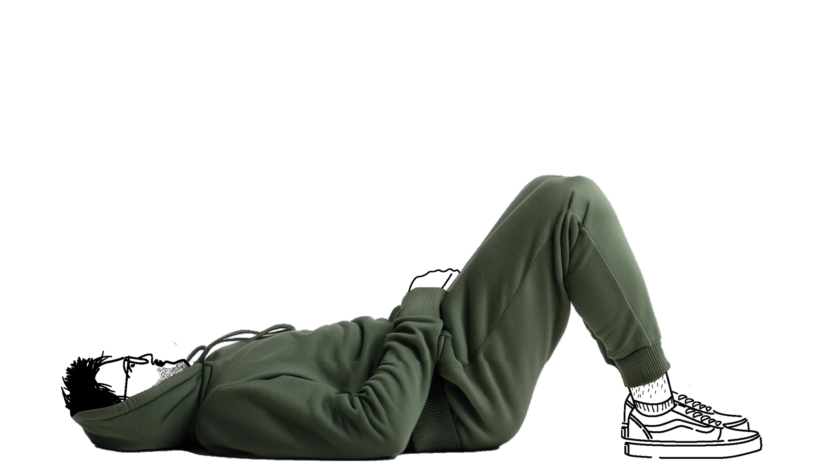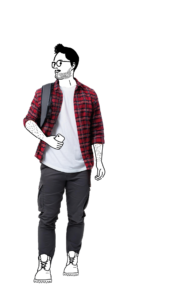-
 Illustration: Joudi Mahouk, Gloedcommunicatie
Illustration: Joudi Mahouk, Gloedcommunicatie
Vincent Decates, Vox editor, prefers to wear shorts to university whenever possible. Is it appropriate? Opinions vary, as he discovered during a casual survey around campus.
Outside the entrance of De Vereeniging, I strike up a conversation with American Studies lecturer Peter van der Heiden. The opening of the academic year is about to begin, the sun is shining, and temperatures hover around 25 degrees Celsius—a perfect early September day. A colleague of Van der Heiden joins the chat, mentioning he’s donned his best shoes for the occasion. Van der Heiden nods approvingly before glancing at my bare legs and sneakers, shaking his head. ‘Not even proper trousers, huh?’
These two are familiar faces, and their playful jabs don’t bother me. It’s not the first time my outfit has drawn comments. Back in my student days, a history professor once chided me for showing up to a seminar in sweatpants. ‘That’s just not acceptable,’ she said firmly.
Once the temperature climbs above 22 degrees, I reach for shorts—preferably sporty or hiking ones. Can’t be bothered with my hair? A cap does the trick. Around the Vox office, several colleagues now walk around in flip-flops—apparently, good examples catch on.
Positive reinforcement
Clothing choices can spark lively debate at a university. Are shorts professional? What about bare shoulders or crop tops? Where do we draw the line? And does it depend on whether you’re a student or staff member?

When asked, the university spokesperson (invariably dressed in a suit or at least a blazer and shirt) explained there’s no formal dress code at Radboud University. Nor are there national guidelines for universities. ‘There are, however, specific roles where dress codes apply,’ they said. ‘Think of receptionists or security staff.’
But for academics, Vox writers, and students, there are no strict standards. This can lead to tricky situations, notes economist and Assistant Professor Kim Fairley. ‘For me, clothing is very important,’ she says, showing off her colourful outfit featuring a vintage blazer and matching headband. ‘Clothes are a form of self-expression—a part of your identity. Wearing the right clothes can make you feel more comfortable.’
‘But still,’ she adds, ‘I’d be lying if I said students’ attire doesn’t affect me—especially during presentations. It’s not politically correct to say, but a man in a hoodie and cap or a woman in a crop top does give off an unprofessional impression.’
Fairley explains that many of her students will end up in the financial sector or government, industries with clear dress norms. ‘I want to make them aware of that and encourage them to start considering it during their studies. It’s probably similar in law, though it might be different in biology or philosophy.’
‘Attending class in swimwear is a step too far’
Fairley doesn’t directly address students about their attire. ‘I prefer to reinforce good choices positively—for example, complimenting a student in front of the group when they’re dressed nicely. There was one time, though, when I had to act. During my postdoc in the U.S., a research participant turned up in military boots and a shirt with hateful symbols. I didn’t confront him directly but reported it to the university afterward.’
In cases like that, the boundary is clear. But it’s often less obvious when someone crosses the line. Can a student wear swimwear to class? For Fairley (and even me), that’s a step too far. What about sandals or flip-flops? ‘I sometimes wear stylish sandals in summer,’ she says. But what if a student shows up in chunky Tevas paired with white socks? She laughs. ‘Now you’re making it tricky.’
‘I think it depends on the context,’ she concludes. ‘Dress how you like in a lecture hall, but be mindful of the image you project.’
Jesse Miltenburg (21) is someone who pays close attention to his image. I got to know him as a Vox video presenter; he now works for the EO program Hoedan. Vintage jackets, wide-leg trousers, crisp sneakers, and matching nail polish—Jesse always stood out at work.
‘It’s fun to use clothing as a way to express yourself,’ he says. But that doesn’t mean he throws on just anything. ‘I do think you should dress appropriately for the occasion. A formal event is different from a busy lecture. But always with your own flair.’
Matching nail polish

Elsewhere on campus, such as at the law faculty, students rarely dress as boldly as Miltenburg. Law master’s student Max Bongers (25) explains: ‘The law faculty has stricter dress norms.’
‘From the first lectures, it’s made clear that many of us will work in legal professions where these things matter. Showing up at a law firm in sweatpants on your first day would get you sent home immediately.’
Bongers himself doesn’t typically wear a suit on campus, though he does see some of his fellow students opting for one. He prefers a casual-chic style: a shirt with a pullover, and occasionally a pair of tailored trousers. A cap? That’s not his thing. ‘For me, it’s mainly about looking clean and presentable. What you wear exactly is entirely up to you.’
Even for these two students, what’s acceptable attire isn’t always clear-cut. Sandals or swimwear in a lecture hall? Bongers pulls a face and laughs.
‘In the summer, wearing shorts isn’t all that strange’
‘No, I think that’s a bit unhygienic,’ he adds with a grimace. Miltenburg agrees. ‘The same goes for sportswear. It gives off the impression that you’re not taking the lecture seriously, which is disrespectful to the lecturer.’
Shorts? Miltenburg thinks they’re fine. Bongers is less convinced: ‘Not in a smaller tutorial or presentation. Then it makes sense to dress up a bit more.’ He pauses, ‘although, in summer, shorts are not such a strange idea.’
Role model
The students understand the dilemmas faced by economics lecturer Kim Fairley when it comes to ‘educating’ her classroom of young adults. Miltenburg says, ‘If you’re training students to become lawyers, it makes sense to also teach them about the norms within the legal profession. I think it’s fair to address a student’s choice of clothing, but only if it’s tied to career preparation and done with an educational purpose—not just as a critique of their outfit.’

As for whether that kind of guidance worked for me, I’m still wondering. I’ve stopped wearing sweatpants since leaving university, though the voice of my old history professor still echoes in my head as I write this. But a cap or oversized hoodie? Those are still regular fixtures in my wardrobe.
My editor-in-chief gives me a lot of freedom in what I wear. Occasionally, I might get a raised eyebrow, but he knows I always keep a pair of long pants and proper shoes stashed in my desk drawer ‘just in case’ during the summer months. And, of course, I wouldn’t dream of interviewing the university board—or an economics lecturer—in casual sportswear.
The difference is that I don’t hold a position of influence, unlike a lecturer. When you’re standing in front of a room full of master’s students—especially in law—it matters more what you wear than when you’re sitting at a desk emailing spokespersons and writing articles. Just as an administrative assistant might dress differently than a dean.
Large tattoo
The fact that everyone interprets these identities in their own way can be observed in the lecture hall. ‘At the end of the day, you also dress to feel confident and express yourself the way you want. Lecture halls are a hodgepodge of students looking super fashionable, students wearing a shirt and jeans, and students who might come wearing sweatpants. That is exactly what I like to see. I am the last person who would hold a student accountable for their choice of clothing.’
Staff dress standards involve another aspect, explains the cultural scientist: representation. ‘We all understand that shorts and flip-flops don’t look very professional and an ironed shirt does. If you watch the news, for example, you always see newsreaders in neat clothing. As a result, you form a picture of what a professional should look like. The more often we see that image, the more it comes alive. These same dynamics apply on campus. We all have a rough idea of how a lecturer should dress.’
‘Why couldn’t you have a successful financial career with purple hair?’
As she says it, my thoughts wander to the lecturers I have had over the years, and I catch myself thinking that those who actually dressed informally were often the ones I respected the most.
But the idea of what a lecturer should look like is also anything but unanimous: the university is a micro-society, with people from different cultures and backgrounds.
Wolthuis: ‘You see, for example, that with some international students, hierarchy plays a bigger role. They look up much more to a lecturer, and especially a professor, and so will have certain expectations of how that person dresses.’
But does it really matter what we wear, Wolthuis wonders? Why couldn’t someone have a successful financial career with purple hair and an oversized hoodie? ‘I’d love for us to use clothing to question cultural norms. Let’s think critically about what we consider professional—and why. Who decides that, anyway?’
As she rolls up her sleeves, a large tattoo on her arm becomes visible—a statement, perhaps? I (with a tattoo on my own leg) think it’s cool. Especially since I’m sure my old history lecturer would find it ‘inappropriate’.



